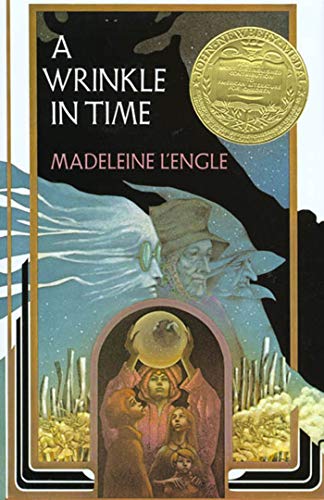It was a dark and stormy night; Meg Murry, her small brother Charles Wallace, and her mother had come down to the kitchen for a midnight snack when they were upset by the arrival of a most disturbing stranger.
"Wild nights are my glory, " the unearthly stranger told them. "I just got caught in a downdraft and blown off course. Let me sit down for a moment, and then I'll be on my way. Speaking of way, by the way, there is such a thing as a tesseract."
A tesseract (in case the reader doesn't know) is a wrinkle in time. To tell more would rob the reader of the enjoyment of Miss L'Engle's unusual book.
Everyone in town thinks Meg Murry is volatile and dull-witted, and that her younger brother, Charles Wallace, is dumb. People are also saying that their physicist father has run off and left their brilliant scientist mother. Spurred on by these rumours and an unearthly stranger, the tesseract- touting Mrs Whatsit, Meg and Charles Wallace and their new friend Calvin O'Keefe embark on a perilous quest through space to find their father. In doing so, they must travel behind the shadow of an evil power that is darkening the cosmos, one planet at a time. This is no superhero tale, nor is it science fiction, although it shares elements of both. The travellers must rely on their individual and collective strengths, delving deep within themselves to find answers.
A well-loved classic and 1963 Newbery Medal winner, Madeleine L'Engle's A Wrinkle in Time is sophisticated in concept yet warm in tone, with mystery and love coursing through its pages. Meg's shattering, yet ultimately freeing, discovery that her father is not omnipotent provides a satisfying coming-of-age element. Readers will feel a sense of power as they travel with these three children, challenging concepts of time, space and the triumph of good over evil. The companion books in the Time quartet, continuing the adventures of the Murry family, are A Wind in the Door; A Swiftly Tilting Planet, which won the American Book Award; and Many Waters. Every young reader should experience L'Engle's captivating, occasionally life-changing contributions to children's literature. (Ages 9 and older) --Emilie Coulter
![]()
